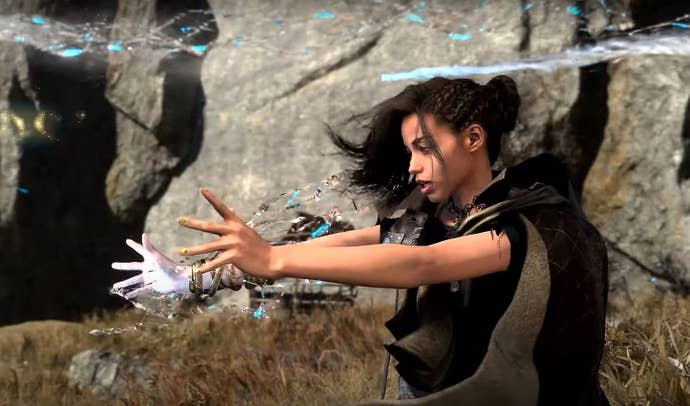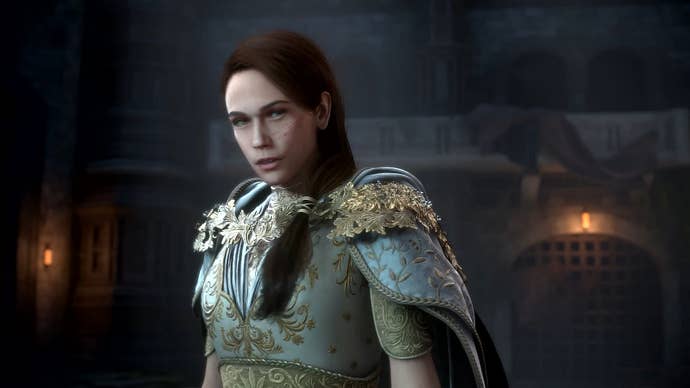
[ad_1]
Forspoken for really cheap in Black Friday is great, actually.
In my original Forspoken review, I spoke to how Frey’s inaugural – and now likely last – adventure in Athia shows off both the sparkling highs of the Luminous Engine’s impressive technology and its bizarre lows.
Forspoken was supposed to be a flagship for Square Enix. Tasked with launching a new IP to rival the likes of Assassin’s Creed, it aimed to marry a massive open-world, exciting combat and a deep and engaging story. For a slew of reasons it has massively failed on that front, eventually limping out as a strange and incohesive hodgepodge that was much less than the sum of its parts.
But now, without the burden of expectation, you can focus on Forspoken’s strengths and skim over some of its glaring weaknesses that have to be seen to be believed.
At a fifth of the original asking price, you can slow down to rubberneck at the – literally – smouldering wreckage that is Forspoken’s opening chapter, rather than have it trigger an existential crisis on the nature of your financial decisions.

It’s the kind of half-baked, incongruent muddle that can only be the result of a studio working with a toolbox that simply didn’t support the vision it was trying to execute, both visually and mechanically. Key plot points that will have worked on paper are turned to nonsense by the scenario they’re presented in. While you’ve also got a main character whose movements were obviously built for skipping across wide-open plains barrelling around dense city streets like they should be shouting “PARKOUR”.
The problem persists when you reach the magical city of Cipal and start taking on side quests, just in reverse. As you trudge around the upper and lower cities ambling after cats or lugging next to someone whose natural stride is faster than your walking speed and slower than your run, you’re left wondering what happened to roasting zombies with giant fireballs and why you’ve seen the same black screen that says “you fed the sheep” four times in the last twenty minutes.
Forspoken has a constantly changing world state, meaning that these side quests are very limited time and very missable, inciting you to slog through them all at once to get everything over and done with. However, without the stick of a full-price purchase motivating you to eke out every second of content from your investment whether it’s worth the effort or not, you can just bin off these diversions and concentrate on having a good time.

With these gristly pieces of excess fat trimmed from your experience with Forspoken, what’s left is rendered much more worthwhile for not having to apologize so heavily for the rest of the package.
Forspoken’s combat is like a complicated, explosive puzzle to solve in every encounter. As you manage a radial menu for each of your hands – one with support magic and one with offensive spells – alternate between pressing and holding different buttons to perform different actions, wrestle with the camera and dodge incoming attacks all at once, things can easily get overwhelming.
But when you eventually grind into the flow of how everything works, get a natural sense for where each of your powers is situated and have a better handle on the limits of your abilities, it’s an incredibly tactile and engaging system which is almost endlessly satisfying and visually stunning to behold.
With four discrete styles of magic to master, there’s also a ton of variety for how you approach encounters, as well as loads of movement and traversal options. This is good because Athia is both huge and beautiful, but incredibly sparse. It’s one of those open-worlds that would be great fun to explore if it had little towns and cities to interact with, but because there aren’t any friendly NPCs you know exactly how exploring everywhere will play out: you’ll whizz over somewhere, there will be three monsters to fight and nothing else.
.jpeg?width=690&quality=70&format=jpg&auto=webp)
It’s a shame because the lore of Forspoken and the worldbuilding under the hood is excellent. You can really tell this was designed to be a series with the level of detail and amount of backstory everyone has, and when you do get to explore more civilized locations like a Tanta’s castle you feel a lot more connected to that narrative.
Really, the best part of Forspoken outside of its combat is its twisty, mysterious and memorable main quest, which does drive the game forward even if it’s poorly paced.
It’s also scored by an extremely good and now hugely underrated soundtrack with gorgeous vocal melodies that recur as motifs throughout Frey’s journey. These elements make the climatic parts of Forspoken’s story genuinely impactful, engrossing and emotional on a par with some much better all-around games.
It makes you wonder how it would have fared as a tighter action game with a smaller scope and denser world, or whether it’s all moot because the engine in its current iteration just can’t produce quieter story elements with any degree of nuance.
However, for its central story and score alone it’s worth giving Forspoken another shot if you’d already written it off. Plus, not only is it cheap in this holiday season, but it’s also legitimately a Christmas game, with the real-world sections taking place across Yuletide.
To give Forspoken a try yourself, you can get it over at GAME in UK (£50 down to £10). Or in the US, Forspoken is in Best Buy’s Black Friday sale.
[ad_2]